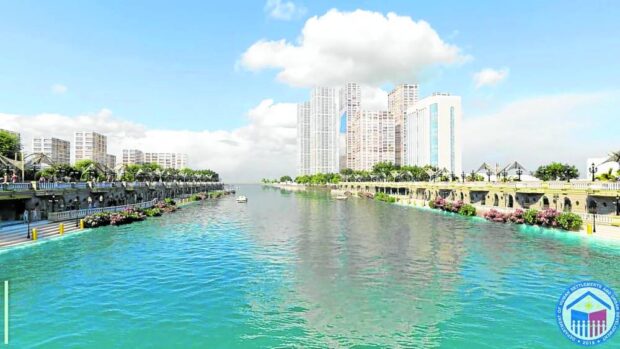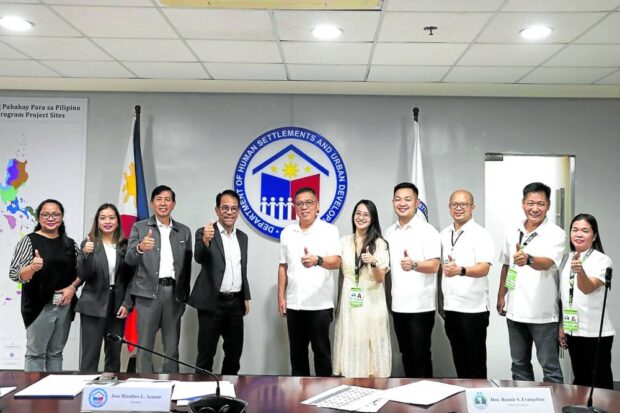
Institutionalized under Executive Order No. 35, the Inter-agency Council for the Pasig River Urban Development aims to bring back the glory of the Pasig River.
With two major tasks handed down directly by no less than President Marcos Jr., the Department of Human Settlements and Urban Development (DHSUD) is challenged to bring the housing sector to a whole new level.
Called the “big push” in the human settlements and urban development landscape, President Marcos Jr.’s Executive Orders 34 and 35 shall serve as the concrete manifestation of commitment of the national government to provide decent and affordable homes in sustainable communities for all Filipinos, especially the underprivileged.
With the launching and implementation of the Pambansang Pabahay para sa Pilipino (4PH) Program, the DHSUD has gained the overwhelming backing of stakeholders—both in public and private realms—bringing the sector to the forefront of government priorities.
The President himself issued the EOs in fulfillment of his commitment not only to the program but, more importantly, to the overall development of the sector, putting premium on the welfare of the poorest of the poor.

Rodriguez, Rizal local government is among the latest LGUs signing up for Pambansang Pabahay para sa Pilipino (4PH) Program. Mayor Ronnie Evangelista inked the partnership with DHSUD Secretary Jose Rizalino Acuzar early December.
Flagship program
Merely a week apart in July, Malacañang released EO 34, formally declaring the “Pambansang Pabahay” as the flagship program of the government and directed government agencies and instrumentalities to submit an inventory of available and suitable lands for the program, and EO 35, which created the Inter-agency Council for the Pasig River Urban Development (IAC-PRUD).
“Lahat po ng suporta ay ibinibigay sa atin ng ating mahal na Pangulo upang tayo’y magtagumpay hindi lamang sa programang pabahay kundi sa pagtulong sa pagbangon sa kahirapan ng ating mga kababayan. (Our beloved President gave us all the support so that we will be successful not only in the housing program but in helping our countrymen rise from poverty),” DHSUD Secretary Jose Rizalino Acuzar said.
“Malaking hamon at responsibilidad ang dala ng Executive Orders na ito, ngunit ito ay patunay din ng malaking tiwala ng Pangulo na magsisilbing inspirasyon para sa buong DHSUD na magdoble-kayod sa trabaho.” (It’s a big challenge and responsibility that these EOs bring, but this also proves of the big trust of the President which should serve as an inspiration to the entire DHSUD to work double time),” the housing czar added.
DHSUD Secretary Jose Rizalino Acuzar and Bacolod City Mayor Albee Benitez in November inspect the ongoing construction of the Yuhum Residences in Barangay Vista Alegre.
Ultimate gamechanger
Acuzar has touted the EOs as the ultimate gamechanger in contemporary times and are expected to catapult the human settlement and urban development sector, particularly its banner program, to even greater heights.
Among the key provisions of EO 34 are: (a) identification of lands for housing and human settlements, (b) land inventory by national government agencies and local government units, (c) acquisition and development of identified lands and (d) expropriation of lands.
Meanwhile, the creation of the IAC-PRUD under EO 35 prompted the launching of the Pasig Bigyang Buhay Muli project—an initiative not only to rehabilitate the waterway but also to maximize its economic potential by transforming its banks into people-centered parks and commercial hubs.
Both EOs fortify specific functions of DHSUD as stated in Republic Act 11201, particularly on development and management of government lands, urban management, protection of vulnerable persons and communities in hazard-prone areas, among other related provisions.
DHSUD Secretary Jose Rizalino Acuzar and Bacoor City Mayor Strike Revilla lead the groundbreaking of the Strike Towers project under President Ferdinand R. Marcos Jr.’s Pambansang Pabahay para sa Pilipino (4PH) Program.
4PH projects coming to fruition
Barely a year after its inception, projects under the “Pambansang Pabahay” are now bearing initial fruits. In Bacolod City, DHSUD and the local government unit headed by Mayor Albee Benitez are set to deliver before the year ends at least 288 housing units at the Asenso Yuhum Residences—a project under 4PH and the first to complete a building.
In Davao City, four buildings under the People’s Ville Phase 1 and Phase 2 project, a collaboration of DHSUD, the Social Housing Finance Corp. (SHFC) and the LGU, are now in final stages of completion. Around 20 projects under the 4PH are now ongoing in various parts of the country as a result of the partnerships entered into by DHSUD with LGUs. The projects are now in various stages of development and construction.
“We are right on track, as evidenced by the upcoming delivery of units in Bacolod and the ongoing development and construction of 4PH projects in Luzon, Visayas and Mindanao,” Acuzar declared.
More than just a housing program designed to address the estimated 6.5 million housing backlog, the 4PH also has a huge potential in unlocking economic opportunities, from job creation to improved property valuation due to wide-spread real estate development.
DHSUD Secretary Jose Rizalino Acuzar, along with other DHSUD executives, inspects the riverbanks and nearby areas of Pasig River.
Bringing back the glory of Pasig River
Immediately after its establishment, the IAC-PRUD, headed by Acuzar, has unveiled the Pasig Bigyang Buhay Muli (PBBM) Project—a massive urban development plan composed of mixed-use commercial areas and open public parks, along the 25-kilometer stretch of the Pasig River from the Manila Bay all the way to Laguna de Bay.
To jumpstart the project, the IAC-PRUD has initially identified eight key areas, with people-centric improvements like jogging paths and bike lanes, from the city of Manila up to Rizal province, traversing major cities in the metropolis.
The showcase area will be located at the back of the Manila Central Post Office while the eight development sections include Arroceros Park Esplanade; along Polytechnic University of the Philippines in Sta. Mesa, Manila; Sta. Ana, Manila; crossing Makati and Mandaluyong; Guadalupe, Makati; Makati Park and Garden–Pasig; Buting, Pasig; and Napindan–Lupang Arenda.
Colossal rehabilitation plan
While focused on the colossal rehabilitation plan, the Marcos project also addresses the settlement concerns of the current occupants in the development sections. The project covers permanent relocation of thousands of informal settler families along the riverbanks under 4PH.
For this purpose, DHSUD has laid out plans with other national government agencies like the PPA, PCG and LLDA. Expressing full support to the project is no other than First Lady Liza Araneta-Marcos whose advocacies include revitalizing the Pasig River into a commercial, lifestyle, tourism and culture hub like the world-renowned Thames and Seine rivers.
The project is a solid manifestation of a holistic and collaborative approach in arresting the country’s urban development woes. Its success will equate to creating a proof of concept that may be applicable to some of the archipelago’s cities with similar metropolitan setting.
Overall, the DHSUD has been steadfast in the performance of its mandates since its creation in 2019 under Republic Act 11201, and more.

